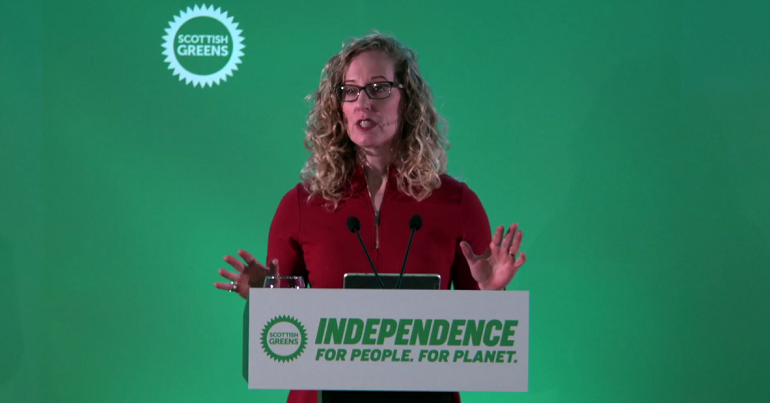Four steps we can take to grow the Scottish Green Party’s success

The Scottish Greens are an incredibly successful party. In the words of a former senior Tory official we are “easily the most successful political party in Holyrood’s history in terms of influence per MSP”. Our opponents aren’t just impressed, they’re frightened, because they’ve seen what Greens can do.
In less than a decade we’ve gone from a marginal force to a party of government and effective campaigning organisation. Last year, we almost doubled our number of councillors. According to the polls, we’re more popular than ever before and we could go from electing 8 MSPs to 18 MSPs. What we’re doing is working.
But with climate breakdown playing out all around us, a cost of living crisis, and the most hostile Westminster government for a generation, we cannot be complacent. If we want to go further and faster on delivering the radical change we need, then we need to build support and elect even more Greens.
That means we need to knock on every door and win every vote that we can, and we need to do it all in a way which is more sustainable and rewarding for our members, candidates and staff. That is why I am running for Elections and Campaigns Committee (ECC) co-convenor.
Here are four key actions I would take to move our party forward as ECC co-convenor:
1. Making effective campaigning easier
Our Target to Win strategy has proven itself incredibly effective, but we need to get much better at communicating it to activists and organisers, with training to match. For a number of years now we have recommended the Green Party of England and Wales’ excellent ‘How to win elections’ guide, but this is written for First Past The Post elections in a very different context and our own additional guidance can be scattered and hard to find.
I would set up a working group of ECC members, staff and experienced campaign organisers from across branches to produce a Scottish Target to Win Manual – a single easy to understand document which any new candidate or organiser can pick up and use to run their campaign.
We need to make it as easy as we can to get our members out campaigning, and that starts with taking members’ feedback on board. As well as clearer strategy and training, we need to refine our canvassing software, Doras, to make it more intuitive, effective and user-friendly.
2. Reducing volunteer burnout
Our party has burned through ECC co-convenors like almost no other position, particularly women and those from marginalised groups. The role comes with a clearly unsustainable workload for a volunteer. That is a cycle I intend to break.
The remit of ECC and its co-convenors hasn’t changed since we were a party of a few hundred members with no campaign staff. Back then, our biggest election budgets were in the low tens rather than mid hundreds of thousands of pounds. It’s time to reflect on the huge growth we’ve experienced in recent years and to implement the recommendations made by our fantastic 2022 campaign manager, Eleanor.
In particular, in her campaign report, Eleanor called for a clearer distinction between the roles of staff and office bearers. ECC members are often burnt out by the sheer volume of campaign delivery work which falls to them rather than to staff. ECC needs more staff support, allowing elected committee members to spend more time on strategic oversight and making key decisions around campaigns, with staff taking on more of the day-to-day operational tasks.
I’ve spoken to party staff and I know that they would also welcome this clearer distinction between their roles and those of the committee.
3. Working with representative groups to make elections more accessible
Whilst good progress has been made, a lot still needs to be done to make running and winning as a Scottish Greens candidate more accessible for those from marginalised groups. As a young, queer, disabled and working class Green who has been elected, I have firsthand experience of some of the barriers candidates face in contesting and winning elections.
Our Womens’ Network’s Helping Hands report and COSLA’s ongoing work on Barriers To Elected Office lay out clear steps to reduce the barriers faced by women and disabled people respectively. I would prioritise implementing these recommendations and working with all of our rep groups well ahead of the next Holyrood and local elections to make sure more marginalised members are empowered to run and supported to win.
4. Delivering reliable support for branches
Our volunteers put a huge amount of work into this party, and we need to make sure that consistent, accessible, and high-quality training and support is available for office-bearers, organisers and activists.
If elected I will:
- Standardise and improve the training we offer to activists and candidates, including inductions for new branch office-bearers and organisers
- Work with Standing Orders Committee on the proposed branch development guide to make campaigning easier
- Work with branch & rep group committees to develop bespoke support plans for every branch and rep group, prioritising those without councillors and/or MSPs
It could not be more critical for people and planet that our party continues to grow and succeed. I believe I have the right mix of skills, experience and plans to contribute towards that success as ECC co-convenor.
Vote Blair Anderson #1 when polls open on Wednesday.
PS. We hope you enjoyed this article. Bright Green has got big plans for the future to publish many more articles like this. You can help make that happen. Please donate to Bright Green now.
Image credit: Ric Lander – Creative Commons



Speaking as one of the former ECC conveners that the party has burned through (2019-2021; functionally not active for the last six months of my term), I am pleased to see that there is recognition that the role has been extremely hard on those who’ve held it.
What I would add though is that there needs to be a wider understanding in the party, not simply the ECC (Co-)Convener(s), about some of the other contributions to burnout from the role, which I would summarise as “lack of respect” but frankly that doesn’t do it justice.
My experience as convener is that rural branches view you with suspicion as part of the “central party” and will demean and dismiss you for sharing best practice because they don’t think it works there (it doesn’t matter if a door knocked is in Dowanhill or Drumnadrochit, knocking it is still our most effective campaign tool, you just need to plan differently for density), the big city branches will think they know better (and go off and do their own thing, sometimes taking their money with them, showing no solidarity with smaller branches), and if you’re a young(ish) person in the role, older members will outright patronise you in full view of other members on forums like party council.
Members of the Scottish Greens as a whole need to understand that treating office bearers with absolute contempt the way that has been the norm for years is completely and utterly unacceptable, is driving people out of the party, and damaging the party’s ability to campaign and win.